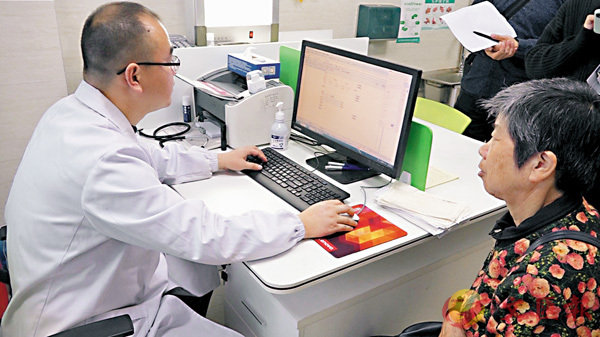 ■醫護人手短缺是不少發達國家或地區都面對的問題,各地開始嘗試將人工智能應用到醫療上,協助醫護人員診症。 資料圖片
■醫護人手短缺是不少發達國家或地區都面對的問題,各地開始嘗試將人工智能應用到醫療上,協助醫護人員診症。 資料圖片【原文】下文摘錄自香港《文匯報》2019年4月24日報道︰
醫護人手短缺是不少發達國家或地區都面對的問題,如何改善醫護供求失衡(imbalance),避免病人延誤診治,成為各地施政重中之重。英國和日本近年便積極嘗試將人工智能(AI)(artificial intelligence)技術應用在醫療上,協助醫護人員診症(consultation)的同時,提高醫療系統行政效率,甚至進一步透過大數據(big data)分析全國國民健康狀況,為預防及提前診治癌症等重症制訂應對方案。
英國首相文翠珊(Theresa May)去年宣佈,將在英國國民醫療服務(NHS)(National Health Service)引入AI及其他智能技術,透過分析國民的基因、醫療記錄及生活習慣等資料,提早計算出患癌的風險,及早提供診治,目標是在2033年前,將癌症死亡數字減少2.2萬人。文翠珊形容,AI是人類對抗疾病的新武器(weapon),不單可挽救成千上萬人的性命,更能讓整個醫療系統邁進新時代。
英國一些眼科醫院與AI企業DeepMind合作,訓練AI系統掃描病人瞳孔影像,以診斷是否出現眼疾,並提供診斷建議。DeepMind亦與其他醫院合作,利用AI協助醫生制訂放射治療(radiotherapy)方案。由於NHS是全球最大的單一醫療機構,擁有龐大的病人數據資料庫(database),可助AI更快得出準確診症結果。然而,過往病例數據多為實體檔案,若要採用AI,必須將資料電腦化(computerize),預計將花費大量人力物力,AI分析數據亦可能涉及私隱問題,萬一誤診(misdiagnosis)責任何在亦可能出現爭議。
日本政府則計劃與企業及學者合作,在未來5年投放逾1億美元(約7.8億港元),目標在2022年前建造10間以AI支援醫療服務的醫院,希望改善診症效率。
由AI專家和醫療設備生產商共同研發的AI系統,可在醫生為病人診症時,根據他們的對話,自動更新病歷,讓醫生有更多時間與病人討論病情。AI也可協助醫生分析病人的磁力共振掃描(magnetic resonance imaging scan)、內窺鏡影像(endoscopic image)、血液樣本和脫氧核糖核酸(DNA)(deoxyribonucleic acid)等資料,決定最適合的治療方案。研究人員亦會從血壓監察器(blood pressure monitor)和心電圖(electrocardiogram)等儀器收集數據,建立國民健康資料庫,增加AI診症的準確性(accuracy)。不過,AI仍然只屬支援角色,最終診斷由醫生決定。
Britain and Japan take the lead in the new era of AI-powered medicine
【譯文】Many developed countries or regions have been suffering the shortage of medical professionals, so that addressing the demand-supply imbalance in the healthcare sector and preventing delayed diagnosis have become the top priority of many administrations. Britain and Japan have been actively applying artificial intelligence (AI) to medical treatments in recent years in hope of assisting medical staff in consultation, enhancing the administrative efficiency of the healthcare system, as well as accessing the health condition of people by big data analysis in order to draw up corresponding plans for the prevention and advanced therapy for serious and potentially deadly diseases such as cancer.
The British Prime Minister Theresa May announced last year that the National Health Service (NHS) would introduce AI and other smart technologies to analyze information such as patients' genetic data, medical records and lifestyle habits to spot cancer and provide early diagnosis and treatment, aiming to prevent 22,000 cancer deaths a year by 2033. She described AI as the new weapon to fight against diseases and help save thousands of lives, as well as open up a whole new era for the entire medical system.
Some eye hospitals in Britain have collaborated with the AI company DeepMind to develop an AI system to help interpret eye scans hoping to predict eye diseases and provide appropriate referral recommendation.
The company also worked with other hospitals on AI-based radiotherapy treatment. As the world's largest single medical institution, NHS has a huge medical database with a tremendous amount of patient data, which helps AI to make accurate diagnoses. Yet, the paper-based patient records would have to be computerized before the AI technology could be applied, which requires a considerable amount of manpower and resources. Besides, data analysis by AI might involve privacy issues and disputes might arise in case of misdiagnosis.
On the other hand, the Japanese government plans to spend over US$100 million (approximately HK$780 million) in the coming five years in cooperation with companies and scholars for building 10 hospitals with AI-supported medical services by 2022, with the goal of improving the efficiency of medical consultation.
The AI system, jointly developed by AI experts and medical device manufacturers, can automatically update the medical records simply based on the conversations between doctors and patients during consultations, in order to allow more time for their discussions.
The system can also assist doctors in analyzing patients' magnetic resonance imaging scans, endoscopic images, blood samples and deoxyribonucleic acid (DNA) etc. to plan for the most appropriate medical treatment. The researchers will also collect data from blood pressure monitors and electrocardiograms to create a national health database to boost the accuracy of AI consultations. Nevertheless, AI plays a supporting role only and the final medical decisions are still to be made by doctors.■龐嘉儀
Q&A
1. DeepMind研發的神經網絡能辨別出多少種眼部疾病?
2. 承上題,DeepMind對眼部疾病的診斷準確率高達多少?
3. 目前有哪些大藥廠與AI公司合作開發新藥物?
4. 哪個國家的 AI醫療新創募資額冠絕全球?
5. 中國有哪些科技巨頭亦邁向醫療領域發展?
Answer
1. 超過50種
2. 94%
3. 輝瑞(Pfizer)、諾華(Novartis)、賽諾菲(Sanofi)等
4. 美國
5. 阿里巴巴(Alibaba)、騰訊(Tencent)等

